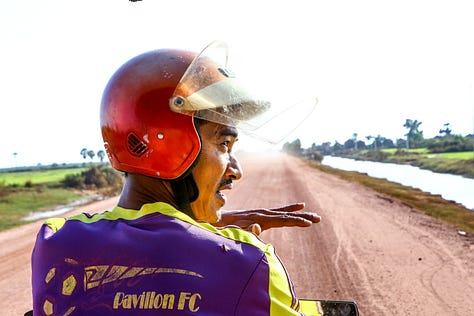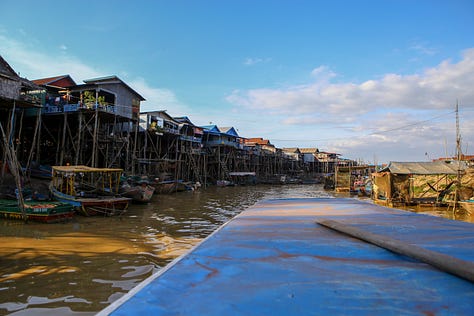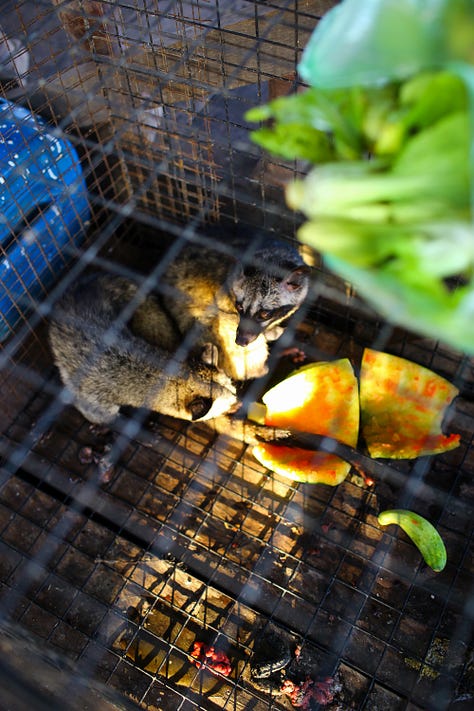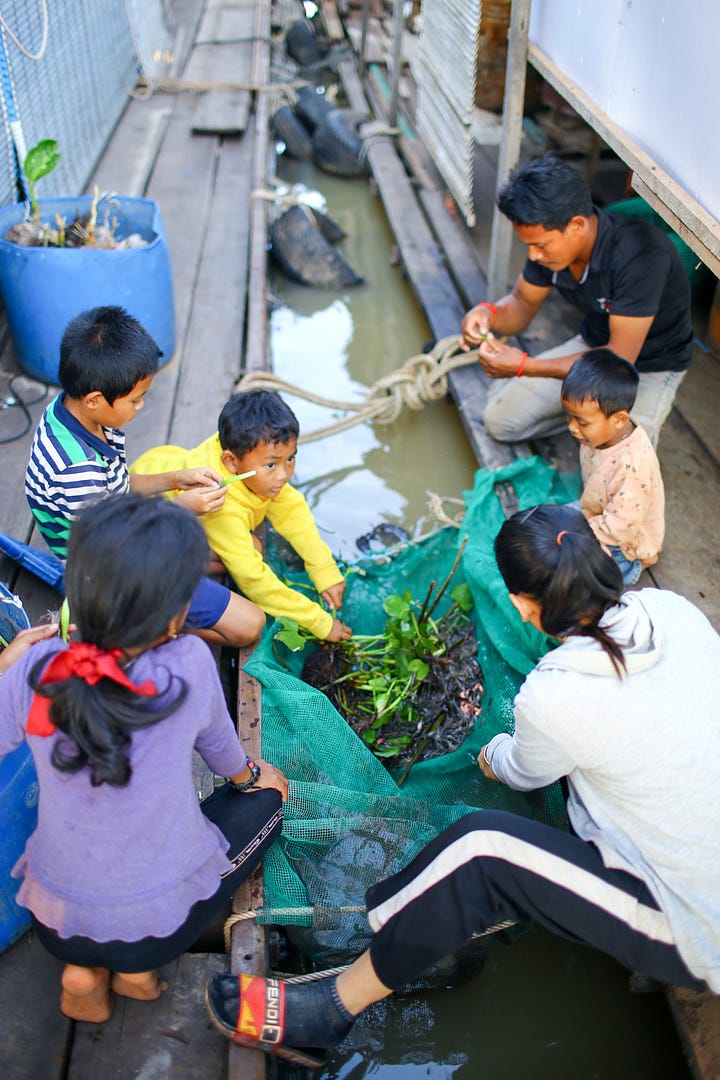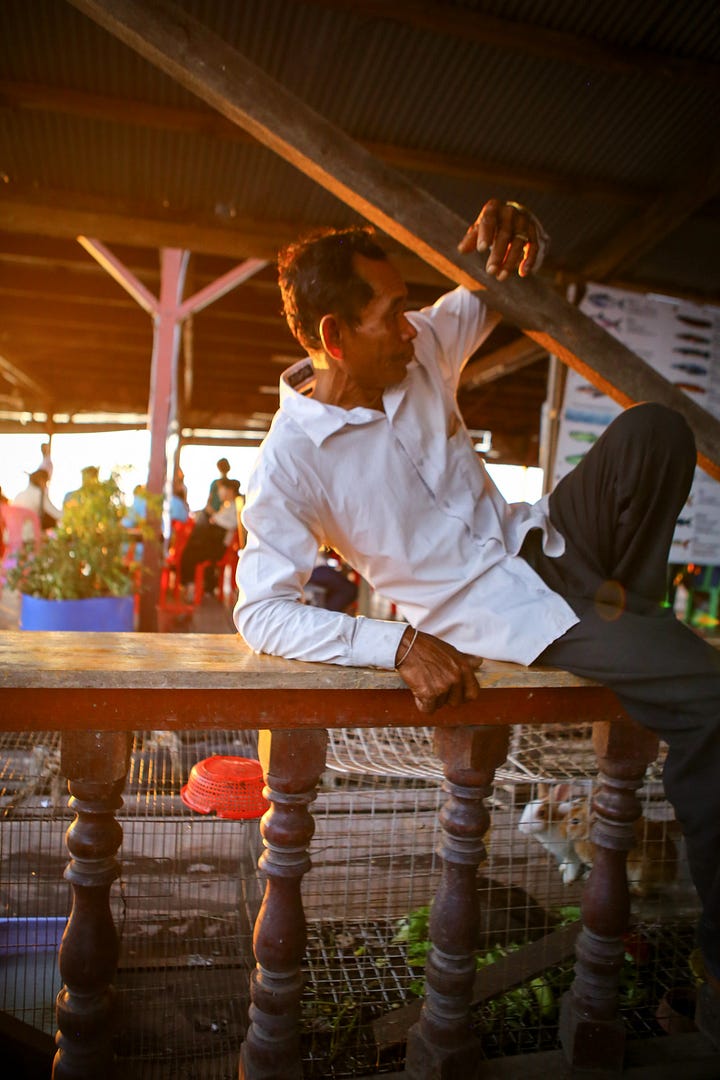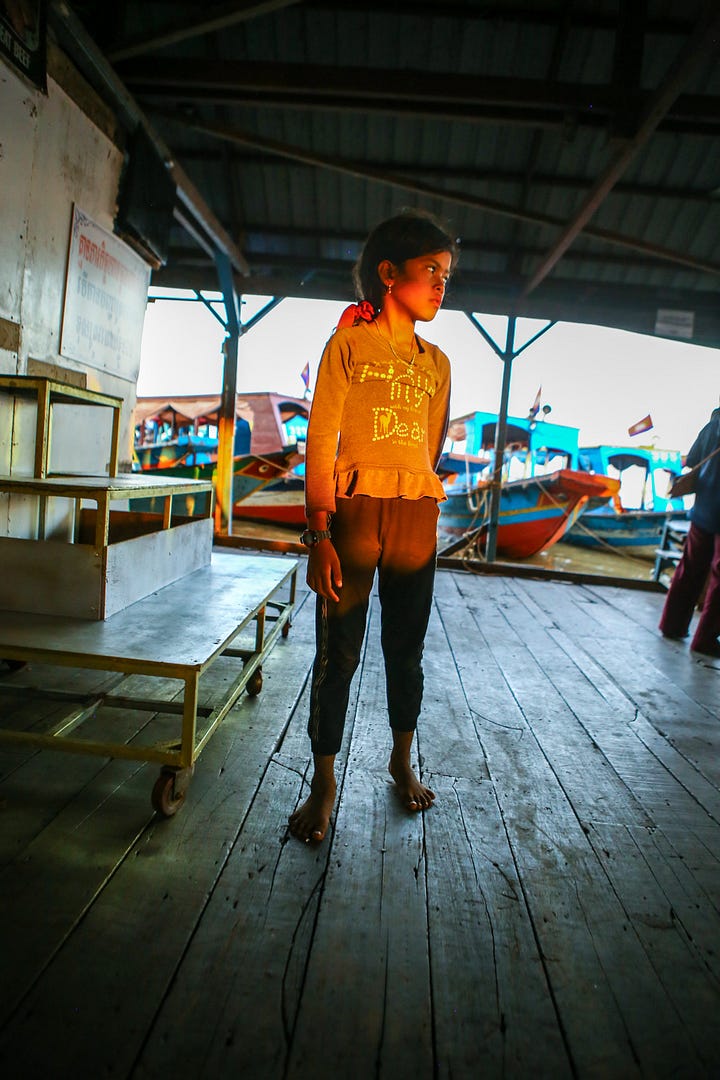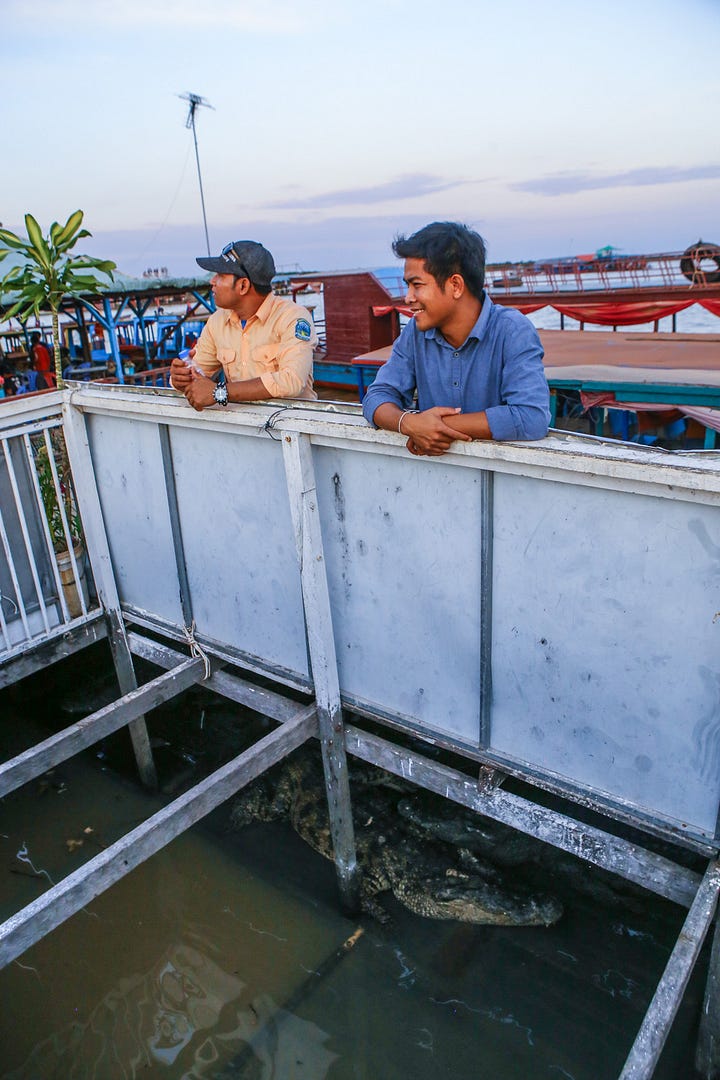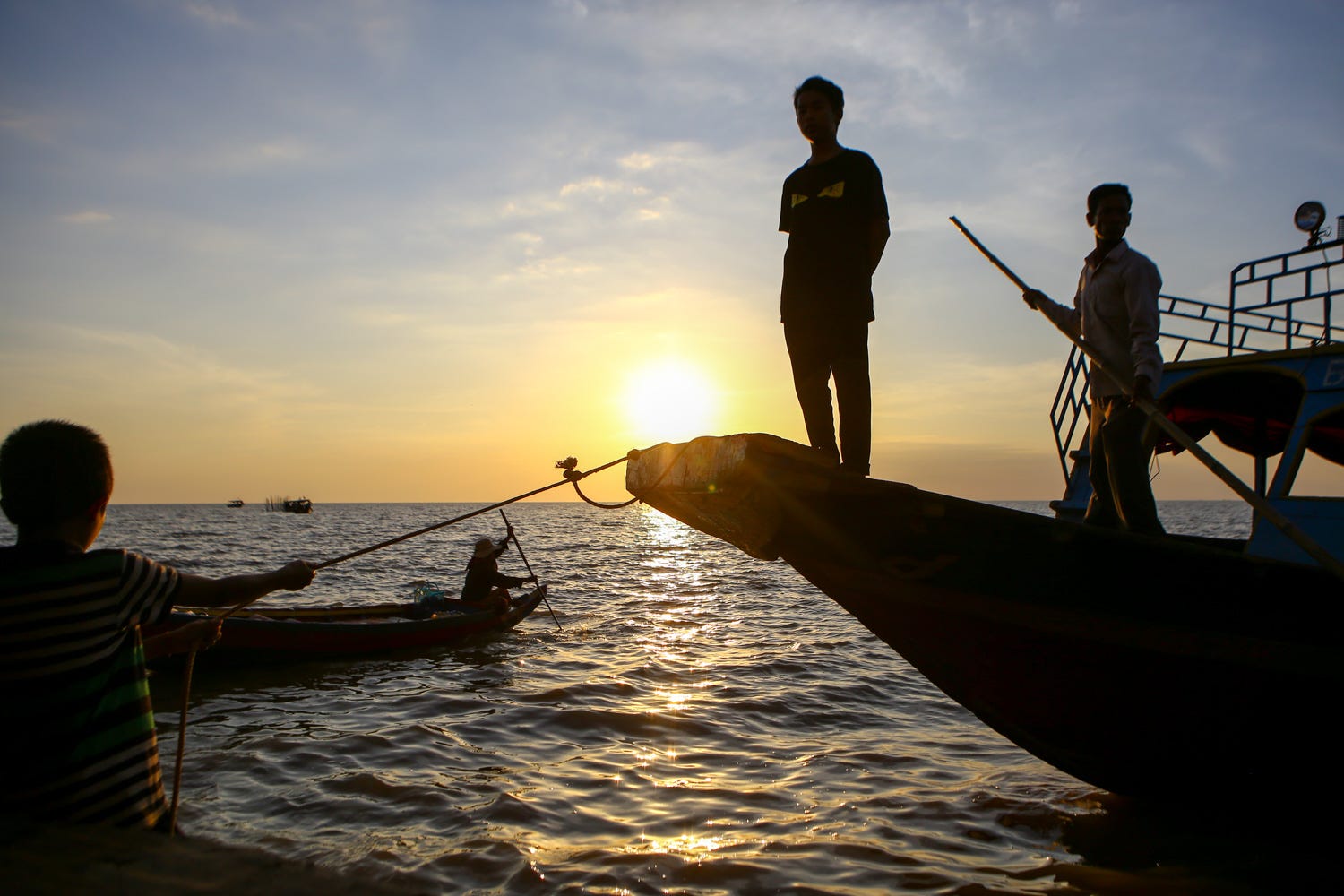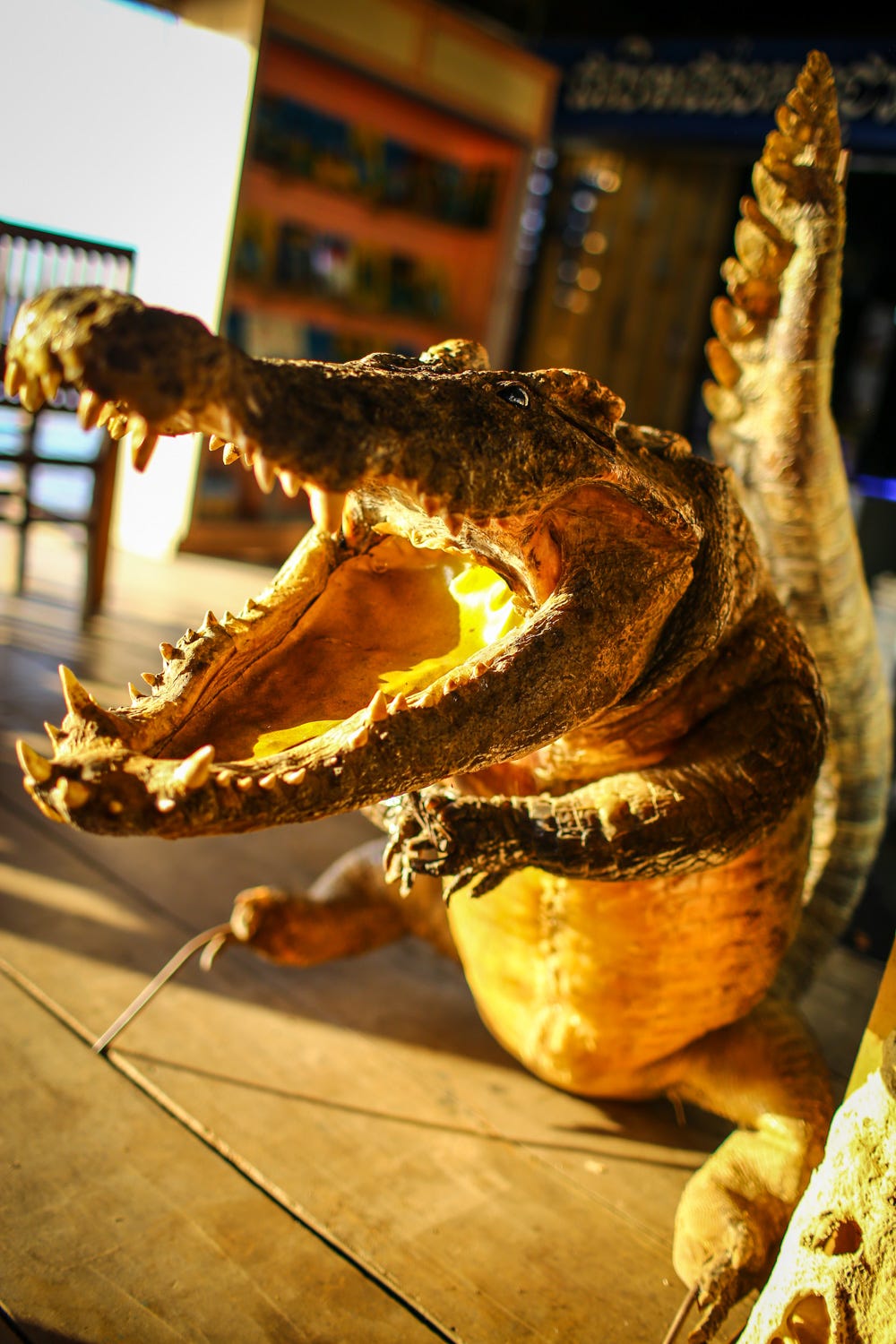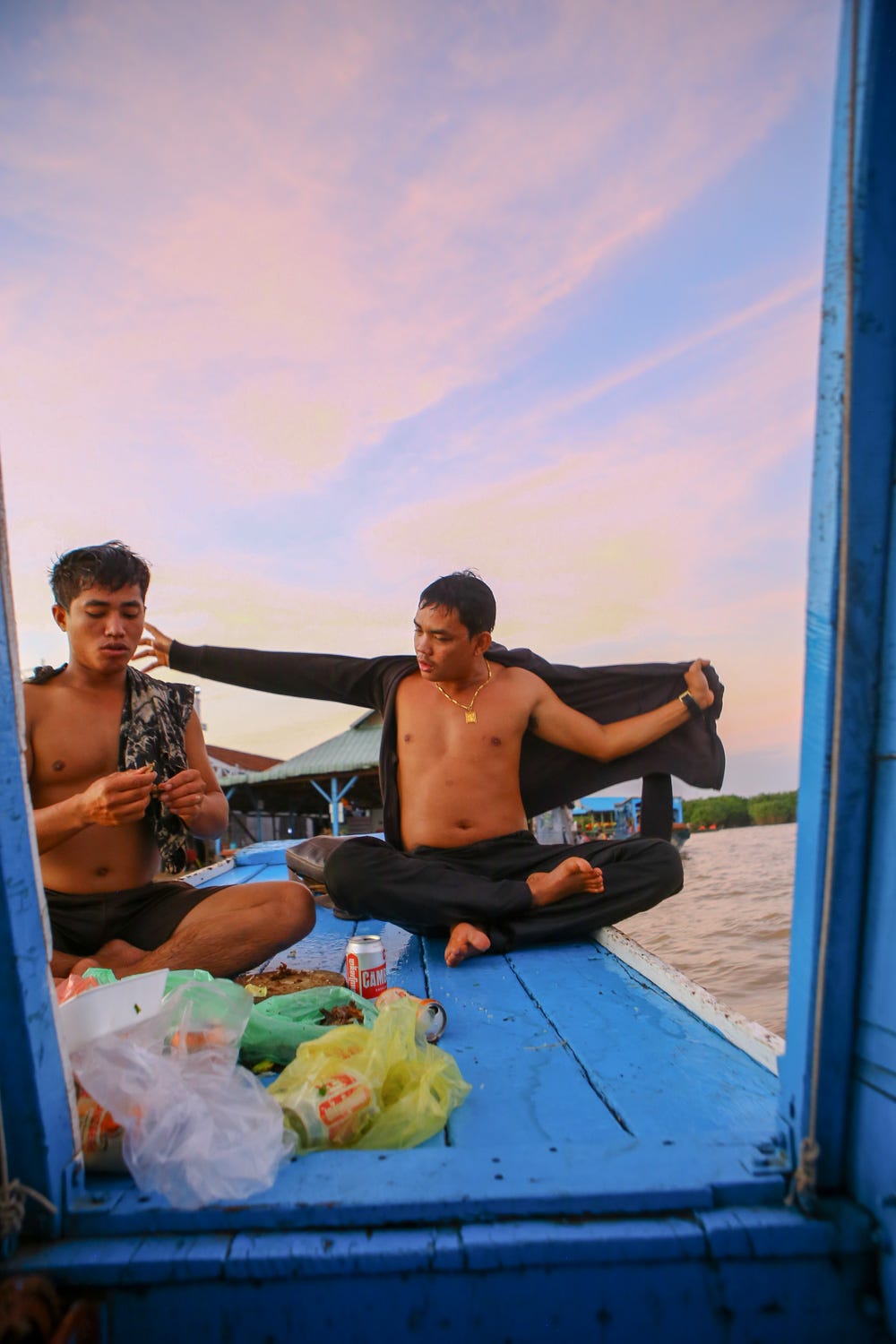The Dogs Of The Lake
Come sir, we have crocodile. We have beer.
There are four roads out of Siem Reap, fanning out in the cardinal directions through the dusty fields and scattered jungle.
The road north leads to magnificent Angkor Wat, to the last remains of a tumbled empire, its moated and magical temples waging their eternal battle with the giant tetrameles. West leads to greasy, lascivious Poi Pet, the casino-choked border town and the gateway out of Cambodia and into Thailand. East leads to the capital, Phnom Penh, to the killing fields and the genocide museums. And to the south, the lake, the great murky soul of Cambodia: Tonle Sap.
In the age the Khmer Kingdom, water was diverted from Tonle Sap for irrigation, turning the plains of Angkor into rich fields to support the world’s largest pre-industrial city. The lake doubles as a highway connecting Phnom Penh and Siem Reap, and its rivers and rivulets extend the water route to Battambang in the west. It flows into the Mekong Delta and out through Ho Chi Minh City into the South China Sea. During the rainy season, the lake nearly doubles in size, with swell waters reaching 12 meters in some places. As a result, all of the surrounding villages are built on stilts, and Tonle Sap is also home to countless floating villages that rise and fall with the seasons, and which have the handy feature of being able to be towed to more convenient fishing locations.
It was the dry season, and the stilted villages drew my attention. I sat in the back of a rattling old Cambodian tuktuk, a kind of covered horse carriage bolted to a motorbike, and bumped my way out of town first east and then south, the roads all reddish sand and lined with impromptu businesses selling dusty fruit or offering haircuts for a few cents. From within Siem Reap, a pleasant and tidy town, Cambodia’s poverty is out of sight. Not so along the rust-coloured roads, lined as they are with dark-skinned naked children and their sun-worn grandparents wearing that look of the extreme rural poor: boredom and exhaustion.
I was headed for the pier at Kampong Phluk, having been warned by my hotel and every driver in Siem Reap that the nearest pier—Chong Khneas, just 15 minutes south of Siem Reap—was a filthy and disreputable place overrun with Vietnamese migrants. It’s unsafe, it’s disgusting, I was told over and over. Avoid Chong Khneas and go for Kampong Phluk, they said: it’s a more wholesome place.
Kampong Phluk is home to about 800 families, each living high above the ground in a simple wooden home with a steep staircase for the dry season. Moving slowly downriver from the pier, the boat driver, a slightly built and heavily tanned young man with a Cambodian soccer jersey sporting the name “Davidinho” spread across his shoulders, pointed out each fishing net and would say, “fishing net.” Sometimes he would point at some fish and say, “fish.” Davidinho was not his real name, he told me, but he doesn’t mention what is. In the dry season, it’s impossible to imagine this place flooded. Dogs and chickens run through the muddy banks of the river, and rice fields and plains spread out from the bank. The dogs are sickly things, just skin and bones. They struggle to lift their legs out of the muck. I ask Davidinho what happens to these when the water is high. He spreads his arms and explains, “Everything dead. Underwater.”

The shore is lined with hundreds of boats identical to the one I’m in, something like the longtail boats of southern Thailand with a small propeller at the end of a long shaft, designed for traversing shallow waters. The rudder is controlled by a Nissan steering wheel connected via ropes on either side of the seats. It’s painted bright blue in stark contrast to the churning, brown water. There are eight seats plus the driver’s, and I notice that in the garbage can under his seat are two emptied beer cans. The river is empty in the afternoon sun.
Davidinho asks me what I want to see, and I gesture to my camera and explain to him that I’m a travel writer, hoping to see some of the floating villages nearby to see how people live, as best I can in a very short trip, and to take some photos around sunset of the floating villages. I think he only hears the word “sunset.”
After about 20 minutes of navigating the river through the village, we make our first stop: a flooded forest. Davidinho explains to me that only women work the small canoes that can go through the mangroves. He’s visibly proud of this, that his town has found gainful employment for as many people as possible, and women contribute to tourism in the town. As we approach the mangroves, I can see other tourists in shallow canoes being guided along a narrow path between the trees. There’s another boat every 10 meters, like a ride at a children’s park, the passing of the little boats so rhythmic they appear to be running on a wire.
I’m dropped at a floating ticket booth-cum-restaurant. A sturdy, barefooted man with half his teeth missing grabbed my arm to help me aboard, genuine warmth emanating from the gaps in his smile. “You want a beer?” he says.
“Boat ticket?” I ask in response.
“Beer!” he counters. I’m lead across to the ticket counter/beer fridge, and further decline offers of beer. Ten dollars gets me my entrance to the mangrove park, and a small, strong-looking woman dutifully paddles up to the steps. In the trees behind her, most sitting or lying down across their canoes, are 20-30 other strong, small, middle-aged women. They eye me suspiciously until I smile, then they smile back and say “good afternoon.” Paddling gently, my guide slides the canoe into the forest.
It’s dreadfully boring and worse than an amusement park. The main river is only about four meters from where we are padding, and the noisy longtails arrive with more tourists, breaking what little serenity existed. As we turn away from the river and follow the path deeper into the mangroves, we encounter five or six boats lining the side of the trail, each laden with junk food, drinks, naked children, and aggressive saleswomen.
“You want some beer, sir?” one calls out. I decline.
“How about some snacks?” No, thank you.
“What about something for madam?” they urge, gesturing to the driver. She isn’t paying attention. In fact, she hasn’t said anything except “hello” since I got on her boat.
“Okay,” I call to the driver. “We can go.”
She paddles backwards, guiding us to another floating shop on the other side.
“Something for madam?” calls the woman. “Something for my kids? Some pens? Some cookies?” She has two scrawny kids, no older than two or three years old, balanced on one knee. I wave the offers away, feeling more and more like an asshole for keeping my wallet in my pocket and increasingly irritated by this floating entrapment. She tries again: “Beer?”
Again, I ask the driver to leave, and this particular nightmare ends. But instead of continuing the circuit back toward the ticket booth, she turns in the opposite direction and heads for open water. Without knowing it, I’d arrived at the lake.
The wind blew head-on, and it was only with concerted effort against the waves that she eventually dragged us to an ominous-looking building about 200 meters from the shore. It was three-storied, with a lookout tower atop a very steep and rickety staircase, wobbling back and forth in the swell. It, like everything else in Tonle Sap, was painted that familiar bright blue. One side of the building faced the sun, and reclining wooden chairs had been set up to look out across the lake. It felt like a further entrapment: a restaurant quite far from the boat I had come on, an unnecessary stop. As we came to rest at the mooring, a pair of eager brothers—maybe 10 and 7 years old, maybe a bit older—reached out to steady the boat. An older woman emerged and grabbed my hand.
“We have beer, sir,” she said. “Come see crocodile.”
How nice it would have been for that statement to be accurate. But she meant crocodiles, dozens of them of all sizes and states of existence. Floating off of the main building was a smaller structure with chain-link guardrails around a hole in the platform, in which lived 30 or 40 baby crocodiles. At first glance, the hole being quite dark, that’s all I saw. But as I walked around the edge of the fence, I noticed that a half dozen adult crocs were in that miserable cage too, looking sedated and desperate and perfectly still, all their animal instinct wasted. Tourists peered nervously over the edge of the guardrail to catch a sight of these majestic creatures. I hoped one might fall in.
I looked around for the woman who had rowed me here, but she and the boat had disappeared. There were a few families of tourists sitting around tables, drinking cans of coke and bottles of beer. I tried to get away from them, from anyone who would enjoy this place, and wandered the now especially grim leather shop and crocodile museum, displaying skulls of various sizes beside old copies of Tin Tin and quite fresh-looking belts and shoes. There was a small shrine with another of the skulls. I left the shop, declining another offer of beer.
Suddenly, I noticed Davidinho. He was sitting with other boat drivers on another part of the floating structure, a can of beer in his hand and a dog sleeping at his feet. The drivers were playing cards and getting happily buzzed. “You want a beer?” Davidinho called out to me. I wanted to see a floating village, I remind him, and he gestures around, suggesting that he had fulfilled that wish.
It was still early, so I decided to leave him with his beer while I took more photos of the place. I discovered several more lazy dogs sleeping in sunny corners, a caged pair of something that look like raccoons and I later learned are palm civets, nocturnal jungle animals common to the area. Beside the cages, members of the family who ran this bizarre museum/leather shop/crocodile zoo have hauled in a fresh catch of undersized lake shrimp. Four children gather around the net, gleefully ripping the heads off of the live shrimp and screaming with joy as they throw them at one another.
I had run out of places to pace on this awful island. There was at least another hour until the sunset, and it was becoming increasingly clear that my boat was staying here until at least then. Spinning around in frustration and boredom, trying to find a place for my eyes to fall that didn’t contain a caged and miserable animal, I finally noticed the sign for where I was. In huge yellow letters, it faced the lake and proudly announced itself: Crocodile Meat Restaurant.
It was time for that beer.
More and more boats were starting to arrive, other bewildered-looking tourists being disgorged onto the dock, into this house of horrors, offered beer and refreshments and a chance to ogle captive creatures or buy their skins or eat them with a light sesame sauce. “Who does this appeal to?” I kept thinking, sitting in the quietest part of the restaurant with a bottle of Tiger beer and one of the scruffy boat dogs resting her head on my knee for a scratch.
“Do you mind if we join you?” asked a pleasant British accent. A woman in her early thirties eased her heavy frame into the reclining chair with visible difficulty. “How much did you pay for that beer?” she demanded as her friends sat down in the two chairs beside her. I told her—three US dollars. She exploded. “What?! Three dollars?! Jesus Christ, Cambodia is expensive. Three dollars! Can you believe that?” she asked her friends. They couldn’t. They were appalled.
“Well,” I began, not sure where the impulse to defend the pricing of this hateful place was coming from, “we are in the middle of a lake, it’s an imported beer, and those crocodiles must cost a fortune to feed.”
“This is supposed to be a developing country!” shrieked the British woman. “If I wanted to pay $3 for a beer I’d have stayed in London.” We agreed to disagree about how that probably would have been better for everyone.
You encounter this type of person while travelling, especially in the developing world. They aren’t quite thrill-seekers, nor are they looking for a bargain necessarily, though they are always cheap. They possess the conviction that they are blessed and that the world exists for them, and that nothing outside of their home region should be complicated or expensive. They turn their noses up in disgust at the thought of the local toilets, the local food, the local people. They compose their photos to focus on their avocado toast and their glass of sparkling wine, cropping out the dusty motorcycle in the background, the half-dead cat languishing in the pile of trash. Their lens is particularly narrow, their vision unusually near-sighted, and they speak a common tongue in the form of an unending series of complaints. Travel is a way to look impressive, a temporary inconvenience to be endured in exchange for a good story later. It is for them that these macabre restaurants exist.
As the women each ordered a beer, I decided that I had seen more than enough of this place, and was desperate to find Davidinho. He was nowhere to be seen. There were so few places to look on this little island that my search for him lasted all of two minutes, at which point I exasperatedly ordered another beer, pointedly and loudly confirming the price with a nod the British woman. The boy who was helping each of the boats land safely noticed me looking around and disappeared, emerging a moment later with Davidinho, his face flushed and red.
“Let’s go see the sunset!” he yelled. “Come.” It was an absurd demand and made me laugh, a welcome return to our stated goal for the day. Davidinho lead me to a cluster of boats and pointed at ours. Sitting on the bow was a dirty hotplate covered in some charcoaled, rich-smelling meat, 20 cans of local beer, and three shirtless men, all laughing with each other. As I boarded, they eyed me suspiciously, this intruder to their party. “You want a beer?” one offered. I showed them my bottle. “Cheers!” they all yelled, and Davidinho steered us out into the lake balancing his own beer between his thighs as he worked the clutch with his bare feet. We wound between the other boats, the men shouting slurred catcalls at any woman we passed, looking to me for encouragement and finding only frowns. They opened more beer, yelled more toasts, and would jump into the filthy water to swim around the boat and shout to other tourists. Another man boarded, quickly removing his shoes and shirt, grabbing a beer and some of the BBQ meat and then dove into the lake. Before long, the sun—a secondary spectacle here—had fallen out of sight and many of the other boats had headed back upriver.
“Finished?” asked Davininho. I looked around the lake, at the crocodile restaurant, now mostly empty, rising and falling gently in the waves. I looked at the soaking wet men lifting blackened meat to their mouths and tearing the scarce flesh—oddly pinkish on the inside—away, chewing open-mouthed and washing it all down with more beer. I looked at the garbage can under Davidinho’s seat, now overfull of empties. “Sure, let’s go back,” I said.
“No, your beer. Finished?” he corrected. It was. He handed me another and then turned the boat around, guiding it toward the mouth of the river. We made a brief stop at the restaurant, where one of the men handed back the grill plate and an enormous cleaver that I hadn’t previously noticed. He scraped the rest of the meat into a plastic bag, turning up the edges to create a makeshift serving platter. Further upstream, back at the ticket booth for the sunken forest, two of the men disembarked, to my enormous relief. Another jumped on. It seemed to be an unspoken rule of this boat that anyone who joined removed their shirt, and he quickly did, then sat down and started picking through the bag of meat. He spoke English well, introduced himself warmly, and asked about where I was from and what I had seen in Cambodia. Gradually, I was relaxing, the ominous air hanging over the evening being dispelled through more genuine Cambodian warmth. In the dying light of day, we passed boats with familiar faces—the women of the sunken forest, their children now clothed, their canoes stowed as they powered upstream in improvised motorboats. We chatted as this new man ate, as Davidinho quietly drove and sipped his beer. At last, feeling as though he was being rude, the man extended the plastic bag with the meat toward me.
“Here, please,” he said. “Cambodia specialty.”
“I’m fine, really,” I insisted. I peered into the bag at what looked to be a rack of ribs, small and mostly meatless, charred black except for a yellowish and vile-looking section of fat. It smelled delicious, and I was getting very hungry, but I had no appetite for this, whatever it was.
“It’s dog!” he beamed. “You have to try.”
I blinked at the meat, trying to understand what part of what-sized dog would have produced this cut of meat. Then I remembered the dogs on the floating restaurant, all shapes and sizes lazing in the heat of midday.
“Is this from the floating restaurant?” I asked.
The man and Davidinho burst out laughing.
“No!” they said in unison, shocked by the impertinence of the question. “It’s from town,” the man explained. “The restaurant dog meat is no good.”
I didn’t ask which town, but simply waved the meat away. The man grabbed one of the charred pieces by the bone and teethed away at the meat, smacking his lips for extra effect. I stared out across the darkening river, where lights were coming on in the stilt houses. Fishermen and women huddled by nets, mending the gaps by headlamps while swatting away swarms of flies.
“Do you have plans tonight?” shouted Davidinho over the engine noise. “Come party with us. We can find girls.”
“No,” I said instantly. “I’m not interested.”
“Why?”
“I have an early day tomorrow,” I said, a half-truth. It was only 6:30 p.m., so it rang untrue.
“Come with us! We get more beer, we find some girls. They will like you!”
“No thank you. I have some things to do.”
“Let’s go now! I will call your tuktuk driver and tell him to go home!” I couldn’t tell if he was being playful; his eyes were fixed straight ahead, straining to see obstacles in the water.
“Just take me back to the dock,” I said, then added, “Cheers!” and smashed our beer cans together. This seems to satisfy him.
Before long, our boat came to a stop at a random jetty, and the other man disappeared into the night with the bag of dog bones. It was just Davidinho now, brooding somewhat. Was he embarrassed that I had refused his offer? Was he angry? Did he think I was a snob for turning him down? He helped himself to another beer and thrust the boat full-speed down the river.
In a day of madness, this was the maddest thing. The river was not only narrow, but it was lined on both sides with those parked longtail boats, their engines raised slightly out of the water. The navigable space must have been only four or five meters across, and other boats were making their way upstream. It was now totally dark, and visibility was limited to the shallow depth of our single, weak headlight. A boat would become suddenly visible out of the darkness, and Davidinho would swerve around it, shooting waves and mist in our wake. There was no point telling him to slow down. This was a man possessed, unsmiling, reckless. Or was it a boy, drunk on payday, hormones and cheap beer turning him into a showoff?
The other boat drivers laughed and smiled as we passed, shaking their heads in a comforting way that told me this specific madness was normal here. And it was all over quickly, anyway. We were back at the dock, where my tuktuk driver was waving and happy, and after a quick nod, Davidinho was gone.
“Good day?” he asked as I climbed into the back of the tuktuk.
I wondered if he knew how strange this all was for an outsider, and how finely tuned the whole thing had been to specifically appeal to those seeking strangeness. It was certainly something Cambodia on the whole embraced: exotic and unusual foods to shock and awe. As a tourist, it’s hard to know if locals eat these foods as elaborate theatre, out of desperate poverty, or a bit of both.
I told him the truth: it was very unusual and interesting. He nodded. “Back to the hotel?” he asked.
We bumped along the lake road again and the simple lives of these people dependent on the lake continued to reveal themselves in glimpses: a family gathered beneath the house to watch TV in front of a fan, an old woman pouring petrol into disused vodka bottles, a man bathing his children with a bucket of water in the dirt, and everyone, everyone, everyone waving when they made eye contact, smiling me away into the night and dust.
